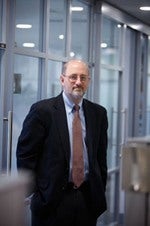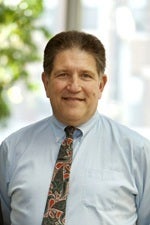Related Topics
Off the cuff: Bill Hanage
[ Fall 2011 ] Why are we seeing so many deadly new forms of E. coli in our food? "Bacteria are a bit like a Mr. Potato Head®. You have the core DNA—which is the potato—and then onto that are…

Eating fish may lower stroke risk
Eating fish a few times a week may be beneficial in lowering stroke risk, according to a new meta-analysis. Researchers examined results from 15 previous studies to summarize the evidence linking fish consumption and stroke risk. According to…
Vitamin A supplement programs improve child survival
Further research needed on more frequent supplementation and alternative dosing approaches, says HSPH’s Fawzi Vitamin A supplementation is an “important child survival initiative,” HSPH Prof. Wafaie Fawzi and doctoral candidate Andrew Thorne-Lyman wrote in the August 25, 2011…
Don't just eat in moderation, make better food choices, HSPH researcher says
Eating in moderation, cutting calories, and avoiding fatty foods isn’t enough to prevent weight gain; rather, it’s important to pay attention to what you’re eating as well, a Harvard School of Public Health (HSPH) professor said August 3…
HSPH researchers honored at National Epidemiology Conference
July 26, 2011 -- HSPH Prof. Marc Lipsitch, postdoctoral research fellow Tuula Oksanen, and doctoral student [[Pamela Rist]] were honored by their colleagues at the North American Congress of Epidemiology 2011, held in Montreal in June. Lipsitch is lead author…

AIDS at 30: Hard lessons and hope
[ Spring/Summer 2011 ] Thirty years after the first official reports about HIV/AIDS, we look back on the human devastation and forward to a changed social landscape. The infection has killed more people so far than has any…

Dean's message: HIV/AIDS at 30: Turning the corner
[ Spring/Summer 2011 ] Anniversaries compel us to reflect, to take stock, to inquire about how we can better carry out our missions. On the 30th anniversary of the first official report on what would be known as…
Carrying on the quest for an HIV vaccine
Donald Francis, SD ’79, has been in the front lines of the battle against AIDS since 1981 and was one of the first scientists to suggest that the then-mysterious disease was caused by an infectious agent. In the…

Tracking the long-term effects of lifesaving drugs
For more than 20 years, George Seage, associate professor of epidemiology, has explored the behavioral and biological aspects of HIV transmission. In September 2010, he received an $82.2 million, five-year grant—the second-largest award to the School, after the federal…

Saving lives by the numbers
In the mid-1980s, HSPH biostatistician Stephen Lagakos enthusiastically chatted up colleagues about a new mode of communicating called email. “He wondered if it would be feasible to set up email among all of us who wanted to exchange ideas about…
